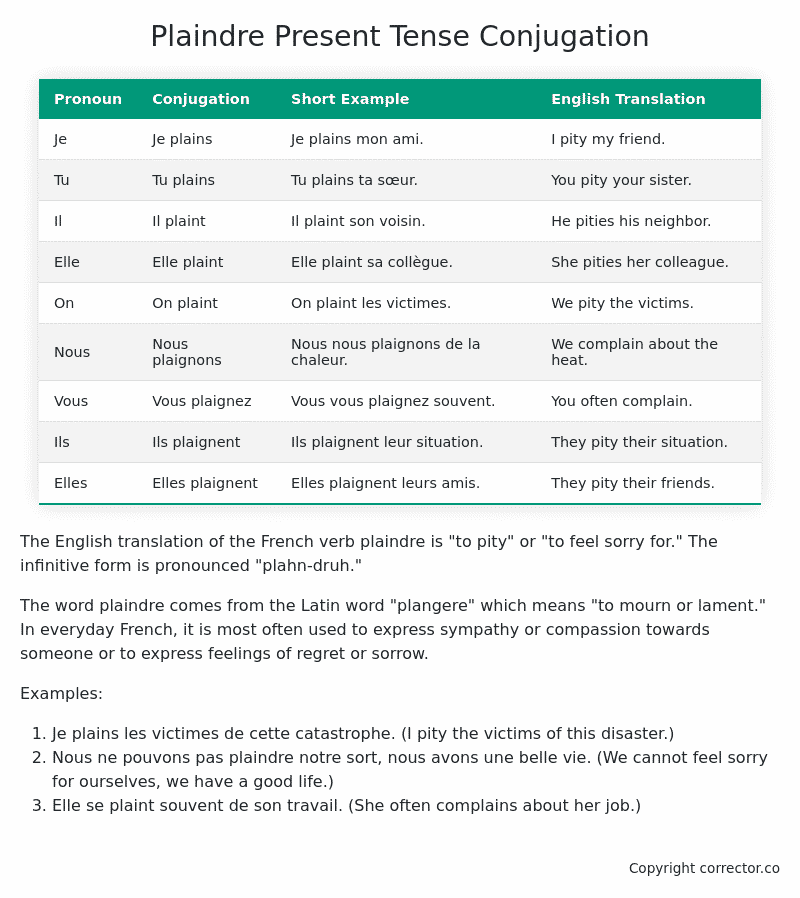Le Present (Present Tense) Conjugation of the French Verb plaindre
Introduction to the verb plaindre
The English translation of the French verb plaindre is “to pity” or “to feel sorry for.” The infinitive form is pronounced “plahn-druh.”
The word plaindre comes from the Latin word “plangere” which means “to mourn or lament.” In everyday French, it is most often used to express sympathy or compassion towards someone or to express feelings of regret or sorrow.
Examples:
- Je plains les victimes de cette catastrophe. (I pity the victims of this disaster.)
- Nous ne pouvons pas plaindre notre sort, nous avons une belle vie. (We cannot feel sorry for ourselves, we have a good life.)
- Elle se plaint souvent de son travail. (She often complains about her job.)
Plaindre – About the French Present Tense
To take a deep dive into all the French tenses then see our article on Mastering French Tense Conjugation.
Common Everyday Usage Patterns For Le Present
Interactions with Other Tenses
Table of the Present Tense Conjugation of plaindre
| Pronoun | Conjugation | Short Example | English Translation |
|---|---|---|---|
| Je | Je plains | Je plains mon ami. | I pity my friend. |
| Tu | Tu plains | Tu plains ta sœur. | You pity your sister. |
| Il | Il plaint | Il plaint son voisin. | He pities his neighbor. |
| Elle | Elle plaint | Elle plaint sa collègue. | She pities her colleague. |
| On | On plaint | On plaint les victimes. | We pity the victims. |
| Nous | Nous plaignons | Nous nous plaignons de la chaleur. | We complain about the heat. |
| Vous | Vous plaignez | Vous vous plaignez souvent. | You often complain. |
| Ils | Ils plaignent | Ils plaignent leur situation. | They pity their situation. |
| Elles | Elles plaignent | Elles plaignent leurs amis. | They pity their friends. |
Other Conjugations for Plaindre.
Le Present (Present Tense) Conjugation of the French Verb plaindre (this article)
Imparfait (Imperfect) Tense Conjugation of the French Verb plaindre
Passé Simple (Simple Past) Tense Conjugation of the French Verb plaindre
Passé Composé (Present Perfect) Tense Conjugation of the French Verb plaindre
Futur Simple (Simple Future) Tense Conjugation of the French Verb plaindre
Futur Proche (Near Future) Tense Conjugation of the French Verb plaindre
Plus-que-parfait (Pluperfect) Tense Conjugation of the French Verb plaindre
Passé Antérieur (Past Anterior) Tense Conjugation of the French Verb plaindre
Futur Antérieur (Future Anterior) Tense Conjugation of the French Verb plaindre
Subjonctif Présent (Subjunctive Present) Tense Conjugation of the French Verb plaindre
Subjonctif Passé (Subjunctive Past) Tense Conjugation of the French Verb plaindre
Subjonctif Imparfait (Subjunctive Imperfect) Tense Conjugation of the French Verb plaindre
Subjonctif Plus-que-parfait (Subjunctive Pluperfect) Tense Conjugation of the French Verb plaindre
Conditionnel Présent (Conditional Present) Tense Conjugation of the French Verb plaindre
Conditionnel Passé (Conditional Past) Tense Conjugation of the French Verb plaindre
L’impératif Présent (Imperative Present) Tense Conjugation of the French Verb plaindre
L’infinitif Présent (Infinitive Present) Tense Conjugation of the French Verb plaindre
Struggling with French verbs or the language in general? Why not use our free French Grammar Checker – no registration required!
Get a FREE Download Study Sheet of this Conjugation 🔥
Simply right click the image below, click “save image” and get your free reference for the plaindre Present Tense tense conjugation!

I hope you enjoyed this article on the verb plaindre. Still in a learning mood? Check out another TOTALLY random French verb present conjugation!


